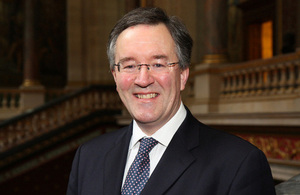Ambassador Andrew Noble Op-Ed
The UK and Algeria are responding jointly to the challenges

Ambassador Andrew Noble
I arrived in Algeria as British Ambassador in June and I am delighted to be here. I have received a warm Algerian welcome and it is a huge honour it is to serve as Ambassador to one of the UK’s key partners in the region. This summer has proved a stark reminded that Algeria remains an island of stability in an increasingly dangerous world. I’m pleased that the UK and Algeria are responding jointly to the challenges.
World leaders will be gathering in New York next week for the annual session of the UN General Assembly. And in Geneva the UK and Algeria sit together on the UN Human Rights Council, which is in session this month. The growing list of international tragedies this summer means it is essential that governments work together in these next weeks to alleviate suffering around the world.
The summer began with tragedy of the conflict in Gaza of course. That so many innocent civilians died, so many women and children, is utterly deplorable. It was impossible not to be moved by their plight. Negotiations to reach a sustainable and durable agreement which tackles the underlying causes of the conflict are vital. It is only this which will put a stop to the cycle of violence.
Elsewhere in the Middle East, IS gaining ground in Syria and Iraq has brought a new level of brutal violence. The recent beheadings and other atrocities are sickening; such disregard for human life is repulsive to all decent people, and to all faiths. As leading British Muslims have said, IS “has no standing with faithful Muslims.” IS’s ambition is to threaten the whole region and the international community must pull together to stop that happening. In a rare positive development in the fight against terrorism, I was so pleased to hear of the safe release of the two Algerian hostages in Mali. The UK and Algeria share a determination to act against the payment of ransoms to terrorists. The payment of ransoms only encourages more hostage-taking and it funds terrorist networks and attacks.
The people of Syria have been suffering for far too long, and more needs to be done to help them. The British Foreign Secretary has invited Algerian Foreign Minister Lamamra to a meeting he is hosting at the UN to try to move closer to a political solution to the conflict. I also hope that Algeria will be part of the wide international support for a UN Human Rights Council resolution later this month holding all those responsible for atrocities to account.
Closer to Algeria’s borders, fighting between the different groups in Libya has reached new extremes. There has been much speculation on what the international community might do to tackle the situation. Discussions are continuing, and Algeria is a crucial part of those. We share the determination that any lasting solution for the people of Libya can only come through inclusive, peaceful dialogue. And as Algeria has demonstrated admirably this summer by hosting the inter-Malian dialogue, there is much that can be done to tackle these difficult issues.
In West Africa, the Ebola crisis is worsening, with more than 2,000 people killed and the World Health Organisation declaring the epidemic an “international public health emergency”. The UK is playing a leading role in the response; we have committed £25m of support and are setting up a crucial treatment centre for victims in Sierra Leone with 700 beds.
The situation in Sudan has continued to deteriorate rapidly during the last year, with increasing violence in certain regions and continued human rights abuses and reports of sexual violence. The UK will be supporting a stronger UN Human Rights Council resolution to help address the situation there.
I hope the discussions taking place in the next few weeks, whether they be in New York, Geneva, London or Algiers, represent a change in fortune for those who have suffered so much this summer.
Updates to this page
-
Added translation
-
First published.